Throughout the last decade, change has been nearly a way of life for Garner, N.C.-based Butterball LLC, whether in the form of market trends, corporate ownership/leadership or modifications to processes.
| Do you think Butterball deserves to be the 2014 Plant of the Year? Vote for them in the National Provisioner 2014 Plant of the Year poll! |
Today, however, with CEO Rod Brenneman nearing his two-year anniversary at the helm of the company, stability and a sharp strategic focus have taken hold. And in this “new world order” at Butterball, the “can-do” attitude adopted by the company’s Carthage, Mo., facility has earned it some key investments over the past two years.
Burger buy-in
In 2011, the Carthage facility was a turkey-slaughter, first-processing plant — birds were killed, boned, processed into whole-muscle cuts and grinds/blends, and then shipped out the door in bulk bins to be further-processed elsewhere. John Lenahan was the Carthage complex manager at the time (he is now the complex manager at Butterball’s recently acquired Gusto Packing plant in Montgomery, Ill.), and explains that when Brenneman joined the company, the mindset around Butterball’s production changed.
|
Exclusive Q&A with Joe Nalley
Listen to the exclusive podcast here. This podcast is online-only editorial content that you can find only at ProvisionerOnline.com. |
“Rod has a very strong vision of our company being very self-sufficient, and at the time, our burgers were being co-packed,” Lenahan explains. “Carthage had some floor space, and the decision was made to bring the turkey burger line in-house. We’ve driven some cost out of our operation, and it also enabled Carthage to gain some needed volume.”
Adding further processing to the equation, however, wasn’t as simple as turning on a switch and running, he adds. There certainly was a learning curve involved.
“When you form a 2,000-pound cardboard combo and put a plastic liner in, it’s not nearly as technical as trying to make sure that your seal is just right on a polybag that the consumer will open, or (if) you’ve got zippers or perforations involved,” Lenahan says. “There’s just a level of detail that was not required [when packing product into bulk bins], but is very critical when producing a product that goes straight to the consumer like our burgers do.”
While the margin of error became tighter, Lenahan stresses that was the only real change required in terms of operations. From a food-safety standpoint, there was no change to the emphasis placed upon excellence by the employees and company. Ideologically, Carthage still was producing a turkey product in which the employees could take pride, but having a branded product leaving the facility helped morale that much more.
“Once we started putting Butterball turkey burgers in a carton, it was tangible; people could see it and feel it,” Lenahan says. “That level of pride really just jumped, and it was fun to see. … They took a lot of pride in seeing the product that was being made. They took a lot of pride in the fact that the Carthage facility, out of all the Butterball facilities, was chosen for burger production.”
|
Community involvement: Andy Hanacek, editor-in-chief, spoke briefly with David Fryar, complex manager at Butterball’s Carthage, Mo., facility, about the relationship between his employees and the community of Carthage. What follows is their discussion: Hanacek: While we toured the plant, we discussed that the company and the city have a very good relationship, and you gave an example or two of how the groups have worked together recently. Can you go into more detail on some of the things the company, plant and employees have done in terms of the partnership with the town? Fryar: Well, as I mentioned earlier, you know, we have the very good relationship with the local fire department. We just recently got approval and purchased a new “Jaws of Life” for the fire department, and when we have drills here at the plant, we have them together with their haz-mat team. Not only that, but Todd Erickson, our safety manager, is our spokesperson with the fire department, and the relationship there is to where you’d almost think those guys were brothers. They tour the plant often, as we want to make sure that if there ever is the need, they know the plant, [inside and out]. In terms of the city council, we also have a really good relationship. It’s probably one of the best relationships between a processing plant and a city that I’ve seen. It just didn’t happen overnight — it’s been years in the making, building trust and knowing that trust is there. Hanacek: How is the relationship with the community and citizens themselves? Fryar: As far as community, we do a lot of community work, volunteering, giving to food banks. As we talked earlier, when the tornadoes hit in Joplin, this plant didn’t hesitate. I mean, right away, it was, ‘What can we do? What do you guys need? We’re here for you.’ Whether it was taking a semi load of ice to the people that lived there, taking products to make sure they’ve got food, taking grills to cook food — whatever it was, our employees did not hesitate to jump on the road, go down there and say, ‘We’re here. What do you need?’ When you talk to the employees out there, they talk about the events that took place and you can just hear the concern in their voice still. It’s been a couple years now, but they still know that there are some people that still are hurting. We have an employee here that [in late June 2013] finally got in his new house. He’s been without [his own] house for the last couple years. … But, you know, our employees are genuine about that stuff. They can’t pretend. I mean, they really, really do care about the community and what’s going on in this community. |
In addition to bringing burger production in-house, Butterball had also begun working with one of its customers on supplying retail ground turkey in a clear, flexible, vacuum package, as opposed to the traditional foam tray-pack setup. The trial runs were performed at the company’s Mt. Olive, N.C., facility, and after the customer deemed the product a success, production was moved permanently to Carthage. Today, the “flex-pack line” takes up residence in a former cooler at the facility.
“Another challenge for the team was, we reduced cooler space in Carthage [to make these additions],” Lenahan recounts. “With that cushion [in space] being gone, the importance of product flow and managing your inventories increases that much more. But the team was able to implement and be successful.”
The additional production lines — frozen burgers and the flex-pack ground turkey production — brought new jobs to Carthage as well. Lenahan estimates that nearly 100 positions were added at the facility, and veteran employees were given the first opportunity to work on the new lines once they were operational.
On automatic
In June 2013, Lenahan was tabbed by Butterball to become the complex manager in Montgomery, and he turned over the reins to the Carthage facility to David Fryar, a turkey-processing industry veteran who jumped at the chance to lead a plant he believes has a bright future.
Fryar sees Butterball’s innovative streak thus far, and believes the company will continue to push the innovation envelope moving forward. He expects to help drive that strategy, particularly at his own facility.
“We’re not just talking about it; go out into our processing plants and you see innovation and investment,” Fryar says. “It’s happening, and we’re going to continue growing these processes.”
Fryar says the biggest challenges that have faced the turkey-processing industry in terms of advancing its processes have revolved around finding technology that was made to handle the big birds.
“Several years ago, a lot of equipment [we saw] may have initially been designed for chickens or red meat, and then they modified it for turkey,” he explains. “But there are a lot of companies out there now who are partnering with turkey companies to design machinery specifically for turkey-processing plants.”
Within weeks of joining the company, Fryar already had begun envisioning his goals for the Carthage plant — from automating jobs in order to place employees in better positions (as opposed to eliminating positions with automation) to expanding current production to fill some of the remaining floor space at the facility.
“We look at some of these jobs on the floor and say, ‘There’s some automation that can be done to those processes, to improve the jobs for the employees,’” he says. “As you bring in the automation, employees have to learn and know how to run that machinery, and they get totally different training to perform tasks that they never could before.
“It’s not taking jobs away from employees, but giving them a different job when it’s all said and done,” Fryar adds. “It’s about ergonomics and taking care of the employees, which takes care of the brands that we produce.”
Fryar envisions growth in the burger-production room as well — with floor space available to install another entire line as demand grows. Currently, growth on the product line has increased steadily, he says, and his hope is that within a year, Carthage will have installed a second burger-production line.
Additionally, Carthage is using production of the flex-pack product, which is very environmentally friendly in terms of its packaging (no plastic or foam tray) as a springboard into examining and further executing a strategy of minimizing waste to landfill.
Fryar has little doubt Carthage will be able to meet and exceed its goals — one of the strengths of the facility that attracted him to the job was the culture and attitude of the employees, and the facility’s perception within Butterball.
“This plant has been known as the ‘can-do’ plant, plain and simple,” Fryar says. “If there’s something that needs to be done, everyone knows if it comes to Carthage, it’s going to get done.”
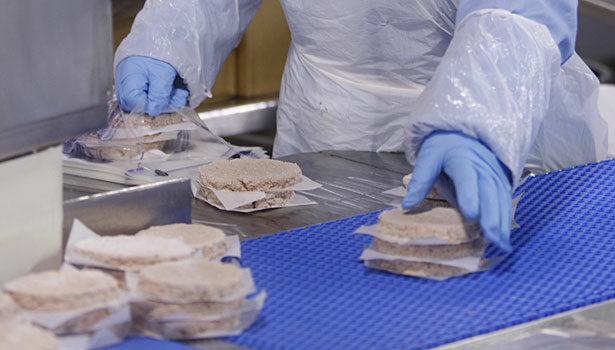
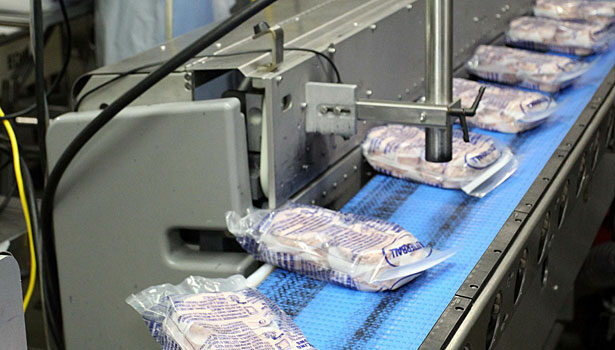
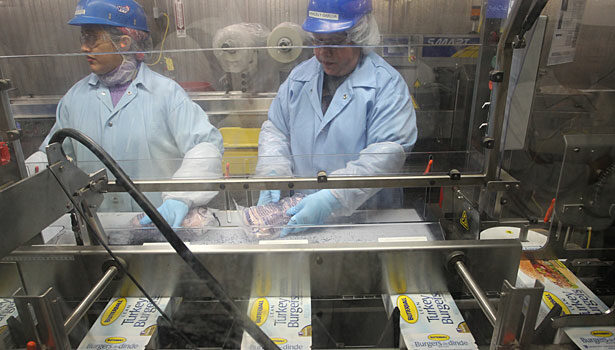
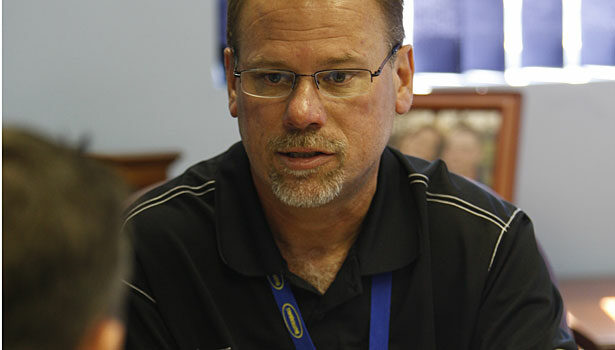
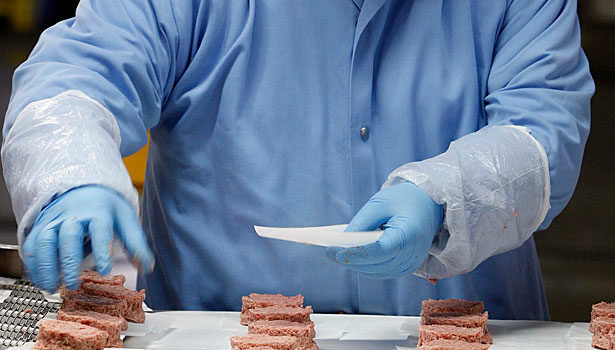
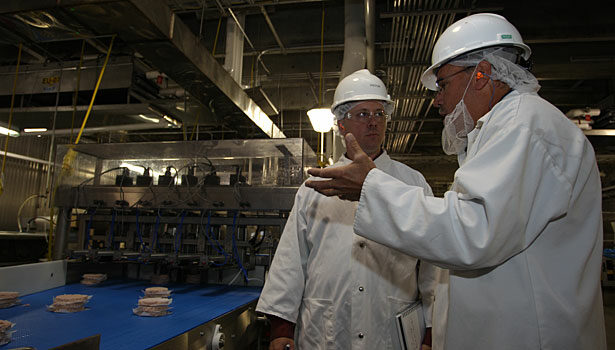
 Butterball chief operating officer Joe Nalley discusses the Carthage, Mo., facility and CEO Rod Brenneman’s influence on the company.
Butterball chief operating officer Joe Nalley discusses the Carthage, Mo., facility and CEO Rod Brenneman’s influence on the company.
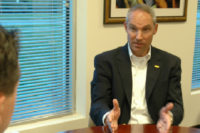
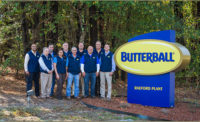
Report Abusive Comment